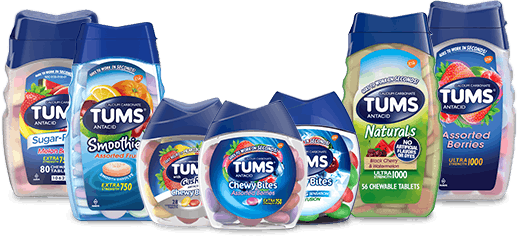How Do Antacids Work?
Learn about the ingredients in your antacid.
Antacids are the most commonly used product for treating heartburn discomfort; and because they start to work in seconds, they're also the fastest way to relieve your symptoms. Available without a prescription, antacids are available in convenient chewable tablets or as a liquid. Most are relatively inexpensive, making antacids a popular product for fast relief.1
Antacids are the fastest-acting heartburn relief available because they start to weaken the acid in your stomach the second they reach it. The weaker the acid in your stomach, the less likely it is to give you heartburn. The longer an antacid stays in the stomach, the longer it works; and having some food in your stomach may actually prolong an antacid’s effect.1
Most antacids contain at least one of these key ingredients: calcium carbonate, magnesium hydroxide, aluminum hydroxide and/or sodium bicarbonate. While all these ingredients work to neutralize your stomach's acid, it's important to know more about them so you can choose the one that's right for you.2
Calcium carbonate
Calcium carbonate is a strong and fast-acting antacid, and it’s been used since the first century.2 Because it's so effective, products like TUMS still use it today.
Antacids that contain calcium carbonate may work longer than those containing sodium bicarbonate or magnesium. The amount of calcium carbonate usually ranges between 500 and 1,000 milligrams per tablet. It's important to take calcium carbonate as directed and not exceed the recommendation on the label.2 When used as directed, calcium carbonate is generally well-tolerated.
Aluminum and magnesium
Aluminum salts dissolve slowly in the stomach, gradually relieving your heartburn symptoms; but they may cause constipation. Magnesium salts act quickly to neutralize acid, but are known to cause diarrhea.3
You could say that two wrongs do make a right because the effects of aluminum and magnesium can balance each other out. Using them together is often considered an effective treatment for digestive upset.3
In recent years there have been questions about the long-term safety of taking aluminum, however. Because aluminum may deplete the body of phosphorus and calcium (increasing the risk of weak bones), some products are no longer using it.2
Sodium bicarbonate
Sodium bicarbonate is frequently found in products like Alka-Seltzer®, baking soda, or as store brand sodium bicarbonate.4 It can work quickly to relieve heartburn symptoms, but it's also quickly eliminated from your stomach—so relief may not last as long.
Because it reacts with stomach acid and can produce a significant amount of carbon dioxide gas, sodium bicarbonate may cause people to belch or get flatulence when they use it.4
Sodium bicarbonate has high sodium content and may not be appropriate for people who are on salt-restricted diets or have congestive heart failure, high blood pressure, or kidney problems. You should speak to your doctor or pharmacist prior to use if you have any of these conditions because it provides an added amount of sodium. Even people who are not sodium restricted should take this into consideration. For pregnant women, antacids containing sodium bicarbonate may not considered to be safe, and you should also speak to a doctor or pharmacist before use.5
Why You Should Talk to a Doctor or Pharmacist About Antacids
Though antacids are great at quickly relieving your heartburn symptoms, they usually don't treat underlying conditions that could be causing them. So if you suffer from heartburn for more than two weeks, it’s important to talk to your doctor.
Like most medicine, antacids interact with other medications. When this happens, the effects of one or both drugs may change, or the risk of side effects may be greater.6 If you're on a prescription drug, it's important to talk to your doctor or pharmacist before taking an antacid.
References
- “Treating Heartburn With Over-the-Counter Drugs.” WebMD, WebMD, www.webmd.com/heartburn-gerd/guide/treating-heartburn-over-counter-medicine.
- “Antacids.” IFFGD, International Foundation for Functional Gastrointestinal Disorders,https://iffgd.org/diet-treatments/antacids.html.
- “Aluminum Hydroxide and Magnesium Hydroxide.” MedlinePlus Drug Information, medlineplus.gov/druginfo/meds/a601013.html.
- “Sodium Bicarbonate (Oral Route, Intravenous Route, Subcutaneous Route) Description and Brand Names.” Mayo Clinic, Mayo Foundation for Medical Education and Research, 1 Mar. 2017, www.mayoclinic.org/drugs-supplements/sodium-bicarbonate-oral-route-intravenous-route-subcutaneous-route/description/DRG-20065950.
- Mahadevan, U. “Gastrointestinal Medications in Pregnancy.” Best Practice & Research. Clinical Gastroenterology., U.S. National Library of Medicine, 2007,https://www.ncbi.nlm.nih.gov/pubmed/17889812.
- Sadowski, DC. “Drug Interactions with Antacids. Mechanisms and Clinical Significance.”Drug Safety., U.S. National Library of Medicine, Dec. 1994, www.ncbi.nlm.nih.gov/pubmed/7727050.


